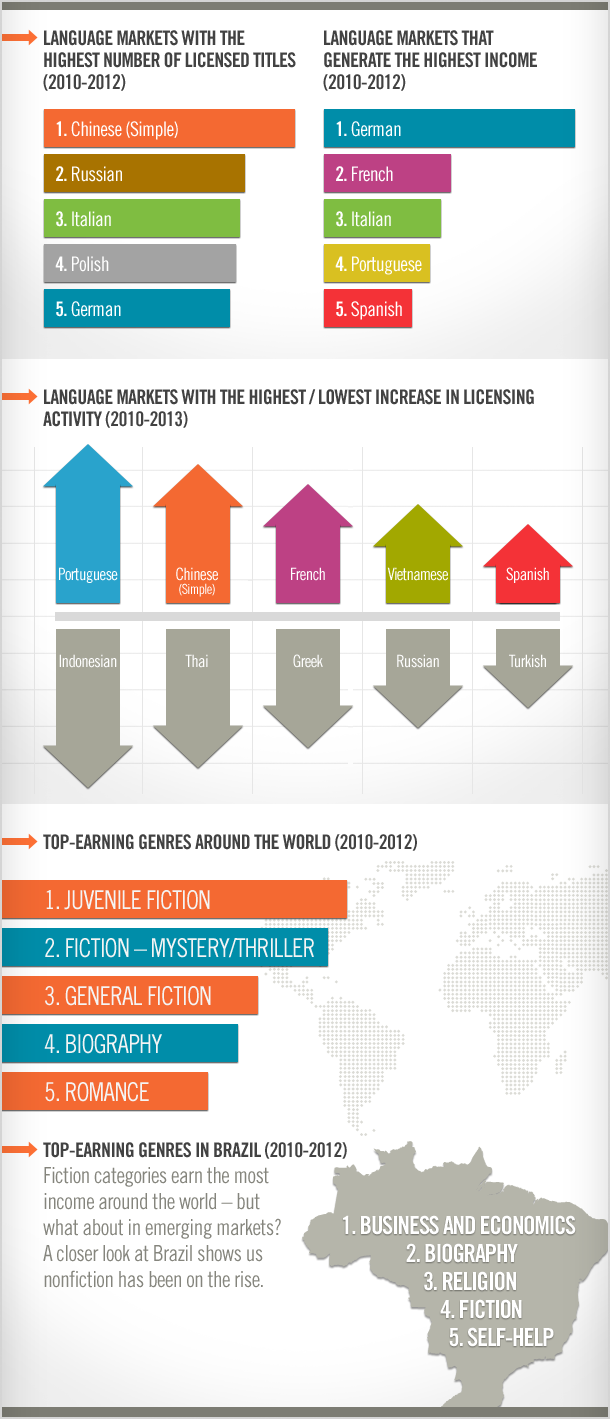
The demand for licensing rights for our authors’ books continues to grow with the expanding global marketplace. When an editor acquires a new book, subsidiary rights become a negotiating point discussed with the literary agent. The Subsidiary Rights groups create additional revenue streams for our authors by licensing the rights granted by agents to our authors’ works. The rights we offer can potentially include English-language reprint rights, foreign-language translations, audio versions, book club editions, pre- and post-publication magazine excerpts (known as first and second serial rights); and occasionally performance rights (for film, television, or stage adaptations).
We sat down with Denise Cronin, Carol Janeway, Linda Kaplan, and Pam White, the leaders of the four Random House Subsidiary Rights teams, to learn about what’s trending in the rights departments, which genres are most in demand, and how the Frankfurt Book Fair has changed over the years.
What countries are trending with translation rights?
Pam White, Vice President, Subsidiary Rights and Markets, Random House Children’s Books: We promote and license our titles across the globe, in all languages. Some markets at present, however, are more active than others, especially China, Germany, France, South Korea, and Japan. Economic conditions in other areas of Europe have made licensing in those markets more challenging.
Linda Kaplan, Vice President, Subsidiary Rights, Crown Publishing Group: We’ve seen that Brazil and Mexico are on the upswing in acquiring translation rights.
Carol Janeway, Senior Vice President, Senior Editor & International Rights Director, the Knopf-Doubleday Publishing Group: Within the Western hemisphere, Brazil is currently one of the strongest markets for translation rights. In parts of Europe, the economic crises plaguing the EU are taking their toll, and book markets for the moment are either treading water or declining, while the Asian market continues to strengthen quietly but steadily.
Denise Cronin, Vice President and Director, Subsidiary Rights, Random House Publishing Group: Brazil (Portuguese-language) is our current “hot zone” for selling foreign rights. In Brazil, we’re licensing all genres from the RHPG lists: commercial and literary, fiction and nonfiction. It is a bullish market and we don’t see this market slowing down.
How do different genres perform in different countries?
Janeway: On a country level, Asian markets such as South Korea and China particularly distinguish themselves by the demand for both business and self-help books.
White: For the past five years, young adult novels have been the most sought-after children’s genre across all markets. In the last year, however, there has been a renewed interest in middle-grade novels and series in many markets.
Have you encountered inquiries from foreign publishers to acquire digital rights only?
Janeway: We see very little interest thus far in discussing digital-only rights deals. Since eBook sales to date are such a modest part of the foreign market, the translation costs amortized over such small sales would be prohibitive.
Cronin: At RHPG, we have four digital-first imprints dedicated to genre fiction: Flirt (new adult); Loveswept (romance); Alibi (mystery/thriller); and Hydra (science fiction). The British market was the first to truly embrace licensing rights for our digital-first titles and we are hoping that the European market will soon follow suit.
Currently, European publishing overall has less than 5 percent eBook sales, so there is tremendous growth potential. We are promoting our digital list and have found that European publishers may still keep a distance on eBooks, but are willing to license the rights for our original eBook titles and publish them in a paperback format.
What are you looking for at Frankfurt this year? Has anything changed in the past few years at the international book fairs?
Kaplan: I think the biggest change is the amazing diversity of the publishers attending. There’s been a huge upswing in emerging markets, and smaller countries are licensing books for translation.
White: As always, we’re looking to establish and maintain relationships with foreign publishers; one of our responsibilities toward each book is to ensure that it’s not only published overseas, but published well, and by the right international partner. The book fairs are an excellent opportunity to have meaningful conversations with international publishers about what is working in their respective markets, what challenges they are facing, and how previously licensed titles are performing.
See where Random House has licensed titles over the last few years and how the market has evolved:


